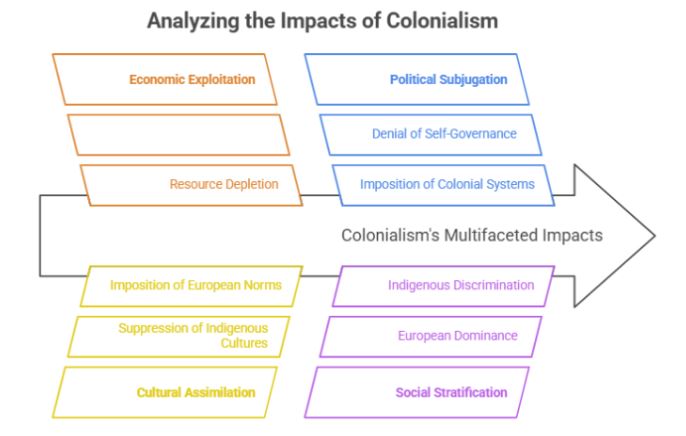Explore the history of colonialism, its causes, and far-reaching impacts across Africa, Asia, and the Pacific. Learn how European powers shaped economies, cultures, and politics, leaving lasting effects on colonized nations worldwide.


Colonialism refers to the practice where powerful nations established dominance over foreign territories, exploiting their resources, people, and markets for economic and political gains.


During 1880s, European countries raced to occupy Africa, for economic and strategic gains.

While colonisation of Africa brought few positive changes, it also resulted in resource exploitation, the enactment of authoritarian governance, and the repression of indigenous African culture and values.
|
|
Pacific |
Central Asia |
China |
|
Causes |
In the late 18th century, European powers such as Britain, France, and Spain began to explore the Pacific islands in search of new territories to expand their empires.
|
Russian and British imperial interests led to the colonization of Central Asia, which was seen as a strategic buffer zone between the two empires. |
European imperial powers sought to establish trading relationships with China and gain access to its vast market.
|
|
Impacts |
Positive: It led to the introduction of Western culture, religion, and language, which had a significant impact on indigenous peoples. Negative: The colonization of the Pacific also led to the exploitation of natural resources, which often resulted in the impoverishment of local communities. |
Suppression of indigenous cultures and traditions, and exploitation of natural resources. |
Poverty and inequality. The suppression of Chinese culture and religion.
|
Conclusion


Refine your answer writing skills and elevate your UPSC preparation with personalized support and expert feedback.
Fill out the form to get started with the program or any other enquiries !








Are you dreaming of becoming an IAS officer? Then, IAShub can be your best guide. It is one of the Best IAS Coaching in Delhi. Many students who want to clear the UPSC exam join IAShub for learning. The institute gives both online and offline classes. Their teachers are experienced and helpful. They easily explain every topic. Students also get notes, tests, and tips to do well in the exam.
IAShub is in Delhi and is trusted by many UPSC students. It offers coaching for every part of the UPSC exam – Prelims, Mains, and Interview. The classes are simple and easy to understand. The teachers are experts and guide students in the right way. IAShub is also known for its helpful notes, test series, and answer-writing practice. IAShub is the best coaching in Delhi and also gives UPSC Online Classes. This helps students from any place in India to learn. The online classes are live and also recorded. So, students can watch them anytime. These classes cover the full UPSC syllabus.
Here are some important services provided by IAShub:
The UPSC Civil Services Exam has three parts:
This exam is tough, but with the right guidance, it becomes easy to manage. Students must study smart and stay regular.
IAShub supports students from the beginning to the end. It gives the right books, tests, and notes. The classes are easy to follow, and the teachers are always ready to help. Students get personal doubt sessions too. The test series and answer checking help students learn where they need to do better. Also, free study materials save time and money.
IAShub also guides students during the final stage – the interview. Experts take mock interviews and give useful tips. This full support makes IAShub one of the best IAS coaching in Delhi.